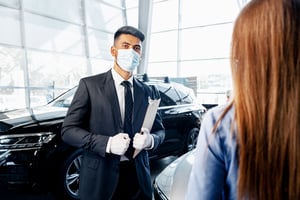
COVID-19: Customers vs. Employees; What's The Difference?
The hope that this start of a holiday week would bring us good news regarding COVID-19 cases is not the case. The numbers continue to rise as have the number of hospitalization and deaths here in New Hampshire. We are in for a proposed increase even more caused by holiday gatherings and travel. We know the right things to do but unfortunately, not everyone is doing them.
PARTNER SPOTLIGHT
Dealer Management System, Computer Technology, Media/Advertising, Automotive Auction, F & I/Aftermarket Products, Automotive Technology Training & Compliance
 A NHADA Gold PARTNER
A NHADA Gold PARTNERComputer Technology, Automotive Shop Equipment, Environmental Services
 A NHADA Platinum PARTNER
A NHADA Platinum PARTNERF & I/Aftermarket Products, Automotive Technology Training & Compliance, Environmental Services
.png?width=150&name=corp_logo_horz_on_light_with_trademark_symbol_1200w%20(002).png) A NHADA Diamond PARTNER
A NHADA Diamond PARTNERF & I/Aftermarket Products, Financial Services, Automotive Technology Training & Compliance
 A NHADA Diamond PARTNER
A NHADA Diamond PARTNERToday we received many questions regarding customers from other states and employees who travel and requests for doing business as usual during a pandemic. There are many resources out there for us regarding state guidelines and from our own NHADA Playbook; but it can all be overwhelming when a question or situation comes up and looking for the answer can feel pretty overwhelming. Here some common tips based on our recent questions for review since typically if one person has a question 10 others have the same questions.
Regarding customers and the risk for COVID-19
The best advice is to think of customers as though they are your employees for the time they are in your business. So how do we handle our employees as they come to work every day during COVID? We screen them, we make sure they wear a mask, and we encourage social distancing. We have hand sanitizer available for them and we encourage frequent hand-washing. Should it really be any different for a customer? The answer is no. Have good signage as customers enter your business is key. It should have the same questions on it you are screening your employees with every day regarding symptoms, travel, and exposure to COVID-19. The sign should explain we have a state mask mandate and masks are required to enter. It should offer a number to call if they feel they should not enter so that business can be conducted in an alternate way such as outside, at a distance, or over the phone.
Regarding customers who come from other states
Some states such as Massachusetts have urged their residents to not travel to high-risk states; New Hampshire is considered a high-risk state. Here in New Hampshire, we consider travel outside of New England as high risk. We certainly cannot police a customer if they are “breaking the rules” for their home state, but again all customers should be held to the same screening as your employees and not allowed in without masks or if they answer yes to any of the screening questions.
Regarding employees who travel
Currently, travel outside of New England is discouraged. If an employee travels outside of New Hampshire for personal or leisure reasons such as visiting friends or family, vacationing, or for the holidays they are required to self-quarantine when they arrive back in New Hampshire for 14 days. There is a new option of self-quarantine for 7 days and be tested on or after day 7 and have a negative test result; then the self-quarantine time can be less than the 14 days. The time they are outside of New England doesn’t matter, if it was meeting friends for dinner, a holiday visit, or a multiple day vacation; the need to self-quarantine is the same.
If the travel was not for personal or leisure reasons there are some exceptions to the need to quarantine and they are: travel for personal safety, medical care, care of others, parental shared custody, for medication, and for food and beverage (brief trips for take out and groceries only), for delivering or picking up a student from an institution of higher learning or a preparatory high school, or for work. Essential travel also includes travel for student and their parents or guardians who are visiting institutions of higher learning or preparatory high schools as potential future students, including allowing the students to remain at the schools for overnight stays. Critical infrastructure employees are also not required to self-quarantine after travel outside of New England. If you feel your employee meets one of these exemptions it should be documented why their travel was classified as essential.
The guidelines and mandates that are currently set for us personally and professionally are for a reason; to save lives by slowing the spread of COVID-19. Not following them based on personal beliefs or thinking this one time won’t matter; well it will. If one or everyone bends the recommendations then we are undoing any good done by those following the guidelines. Please do your part and follow the guidelines and make sure you hold your customers and employees to the same standards.
Together we can all do our part to end this pandemic.



















.png?width=150&name=Ally_Final%20Logos%20and%20Pairings_11.14.2018-01%20(2).png)


-2.png?width=150&name=Wipfli%20Logo%20Blue%20RGB%20(1)-2.png)


.jpg?width=150&name=NHADA_Partner_FTR_Img_NHADA_Insurance%20(1).jpg)


.jpg?width=150&name=NHADA_Partner_FTR_Img_JMA(1).jpg)




